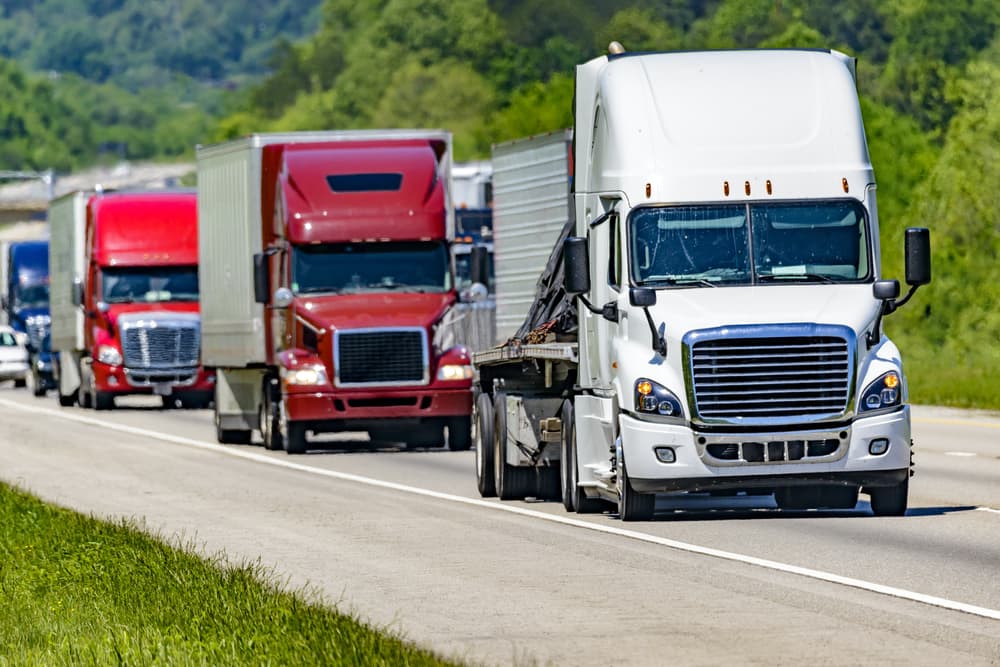While head-on crashes are not as common as other types of collisions, including rear-end crashes, accidents where two vehicles hit each other head-on are much more dangerous. According to the Insurance Institute for Highway Safety (IIHS), frontal impacts caused 57 percent of passenger vehicle occupants’ fatalities in a recent year.
When a frontal-impact accident involves a truck, passenger vehicle occupants are even more likely to die or suffer catastrophic and disabling injuries. In most cases, head-on truck collisions occur due to negligence on the part of the trucker or another driver.
Because of the devastating consequences of head-on crashes, it is critical to determine what caused the crash and identify potentially liable parties. Consider contacting a knowledgeable Phoenix truck accident lawyer to assist you with recovering compensation from the at-fault party.
Causes of Head-On Truck Collisions
The vast majority of head-on accidents involving trucks happen due to driver negligence.
Below is the list of the most common causes of head-on truck crashes:
- Speeding. Drivers are more likely to make mistakes when driving too fast. Drivers often cannot use good judgment when driving at high speeds simply because they have less time to make decisions, not to mention that a vehicle is more difficult to control when moving too fast. Speeding drivers are also likely to miss road signs that redirect traffic or warn that the road is about to split into two opposite directions.
- Bad maneuvering decisions. It takes a lot of skill and experience to maneuver a large truck. Even the most experienced truck drivers can make mistakes when performing maneuvers. For example, a truck may swing into oncoming traffic when making a wide turn.
- Improper passing. Passing on a two-lane road requires sound judgment to avoid crashing into oncoming traffic. Unfortunately, a driver may not have adequate time or space to return to their lane when attempting to pass a vehicle, which is why a head-on collision is likely to happen.
- Failure to obey road signs and traffic signals. A large percentage of head-on crashes occur when a driver runs a red light or otherwise fails to follow road signs or traffic signals. A truck may collide head-on with a vehicle turning in front of it if the truck driver fails to yield the right of way or ignores road signs.
- Distracted driving. Texting while driving and other forms of distracted driving are also common causes of head-on collisions involving trucks. Truck drivers can easily get bored after spending countless hours on the road, which increases the likelihood of distractions. While using a cell phone and driving is arguably the most common type of distraction, other distractions such as eating while driving or reaching for something in the backseat can be just as dangerous. According to the National Highway Traffic Safety Administration (NHTSA), failure to pay attention to the road kills about 3,000 people every year.
- Driving under the influence of alcohol or drugs. Alcohol intoxication impairs a large part of the brain that handles proper judgment and reasoning. For this reason, driving under the influence of alcohol can cause a driver to make mistakes, including driving the wrong way, failing to stay within a lane, or drifting into oncoming traffic, all of which can result in head-on crashes.
- Fatigued driving. Driving while fatigued, also known as drowsy driving, can be just as dangerous as driving while intoxicated. When a driver is tired, his reaction time can slow due to exhaustion. A tired driver’s decision-making and judgment can also be impaired when fatigue sets in during long journeys. There is always a risk of falling asleep behind the wheel, which can cause a truck to cross the center divider line and collide with oncoming traffic head-on.
- Inexperienced driving. A driver who lacks experience may not know all the traffic rules or road signs. Thus, inexperienced drivers are more likely to make mistakes, including driving the wrong way, which can result in head-on crashes.
- Adverse weather conditions. Sometimes, bad weather can contribute to head-on truck collisions, though exercising due care and slowing down can prevent most weather-related accidents. Adverse weather conditions such as snow, fog, and rain can hinder visibility and make it more difficult to control a vehicle.
- Poor road conditions. Improper road signage or the lack of road signs can lead to head-on accidents. If a road sign that was supposed to warn a driver that the roadway is about to split into two opposite directions is missing or not visible, a frontal impact crash is likely to occur. Poor road conditions, including potholes that require drivers to swerve dangerously or drive into oncoming traffic, can also lead to head-on truck collisions.
When investigating your accident, a lawyer will look into the experience and qualifications of the truck driver and determine whether or not the trucking company can be liable for negligent hiring. A lawyer will help you understand what caused the accident and determine whether or not the other party violated any traffic rules or trucking regulations.
Common Injuries in Head-On Truck Accidents
Although head-on collisions are less common than other types of accidents on our roads, catastrophic and life-threatening injuries can happen when cars driving in opposite directions crash front to front. When a head-on accident involves a truck, the consequences can be tragic for occupants of a smaller vehicle.
According to the Insurance Information Institute (III), head-on crashes account for nearly 11 percent of all fatal accidents in the United States. Since trucks can weigh up to 80,000 pounds, passenger vehicle occupants are at risk of sustaining serious injuries and deaths.
Some of the most common injuries associated with head-on crashes:
- Spinal cord injuries
- Paralysis
- Broken or fractured bones
- Traumatic brain injuries
- Crush injuries
- Loss of a limb
- Severe burns
- Internal injuries
- Severe lacerations
- Disfigurement
- Permanent scarring
The sheer size and weight of large trucks can result in disabling injuries. If you sustained injuries in a head-on collision with a truck or your loved one died after a front-to-front crash with a large truck, consider speaking with a lawyer to estimate your losses and hold liable parties accountable.
Liable Parties in Head-On Truck Collisions
Depending on the circumstances of your head-on crash, there can be multiple liable parties, including:
- The truck driver. Truck drivers are responsible for causing a large percentage of head-on collisions. The truck operator can engage in different forms of negligent behavior, including speeding, running red lights, failing to yield the right of way, texting while driving, and others. It is also not uncommon for truck drivers to fall asleep behind the wheel, which increases the risk of a frontal impact crash.
- The other driver. Not all head-on collisions involving trucks occur because of the trucker’s negligence. Drivers of passenger vehicles cause some of these crashes, especially if they negligently enter the lane of oncoming traffic in an attempt to pass another vehicle. Drivers of passenger cars can be liable when they fail to exercise due care when sharing the road with large trucks.
- The trucking company. In cases where a truck driver is an employee of a trucking company, the trucking company can be liable for the negligence of their drivers. Trucking companies are responsible for ensuring that their drivers meet the proper qualifications and obey all safety regulations, including hours of service rules.
- Vehicle or parts manufacturers. If your head-on collision was the result of a design or manufacturing defect, the manufacturer of the defective vehicle might be responsible for the accident. Sometimes, an injured party can file a claim against the manufacturer of defective parts if the vehicle manufacturer did not produce the parts.
- A company responsible for vehicle maintenance. A head-on truck accident can occur when the vehicle is not adequately maintained. When there are maintenance issues, the company responsible for inspecting and maintaining the vehicle can be liable for accidents caused by its failure to maintain the vehicle in a safe condition.
- Government entities. Sometimes, head-on crashes occur as a result of improper road design or inadequate road maintenance. For example, if a sign that redirects traffic goes missing or is not visible to drivers, injured parties can potentially bring a claim against the government agency responsible for maintenance of the road signs in the area where the crash occurred.
You need a truck accident lawyer to investigate the details of your head-on collision to identify individuals and companies that may be accountable for the accident. A lawyer can help you conduct the investigation, gather evidence, and build a strong case on your behalf while you focus on your treatment.
Frequently Asked Questions (FAQs) About Head-On Truck Collisions
How Common Are Head-On Collisions in Arizona?
Arizona is no stranger to head-on accidents on its roads and highways. According to the Arizona Department of Transportation, there were nearly 1,700 crashes in which vehicles hit each other head-on in 2020, which accounted for over two percent of all traffic accidents in the state. However, head-on collisions were among the deadliest types of crashes in Arizona.
Eighty-eight fatalities resulted from frontal impact accidents in 2020, which accounted for more than 13 percent of the total number of deaths on Arizona roads. More than seven percent of all alcohol-related accidents were head-on collisions.
Can You Sue a Trucking Company for Your Head-On Truck Collision?
Yes, you can potentially bring a claim against the trucking company that hired and trained the driver involved in your head-on truck crash. You can hold the trucking company responsible if the driver is an employee of that company rather than an independent contractor.
If a trucking company’s employee causes a collision while performing their work duties, the trucking company can be vicariously liable for the accident. However, an injured party may not be able to sue the company if the driver was driving for non-work purposes or deviated from the usual route or schedule.
How to Prove Negligence After a Head-On Truck Collision?
If you were in a truck accident, you will need to prove negligence on the part of the other driver or another party to be entitled to compensation. However, proving negligence may be a challenging task, especially if you do not have enough evidence to prove that the other party was negligent.
An experienced and results-driven Phoenix truck accident attorney can help you collect evidence to support your case to prove negligence and help you pursue the maximum compensation that you deserve.
What Compensation Can You Seek After a Truck Head-On Accident?
As a victim of a head-on truck accident, you have probably suffered significant injuries and devastating financial losses.
Fortunately, you can seek compensation for your monetary and non-economic damages, such as:
- Medical expenses (past and future)
- Loss of income
- Diminished/lost earning capacity
- Pain and suffering
- Loss of consortium
- Property damage
- Emotional distress
A skilled lawyer can examine your particular case to identify all potential sources of compensation and determine what damages are available in your accident.
How Can a Phoenix Truck Accident Lawyer Help?

If you sustained injuries in a head-on crash with a truck or your loved one died after a frontal impact collision, consider contacting a knowledgeable lawyer to help you pursue compensation for your damages.
The claims process can be stressful, confusing, and time-consuming, which is why you can benefit from having a lawyer manage your case and advocate for your rights.
Your attorney will take the following steps when fighting for compensation on your behalf:
- Investigate the accident scene
- Interview witnesses
- Gather evidence to build a strong case
- File an insurance claim and prepare a demand letter
- Negotiate with insurance companies to fight for the settlement amount you deserve
- If you cannot settle, take your case to court
Having the representation of a seasoned and skilled truck accident lawyer can make a world of difference in your case, not to mention that having a lawyer allows you to focus on your medical treatment to ensure faster and more efficient recovery. Do not wait to seek the legal help you need today.



